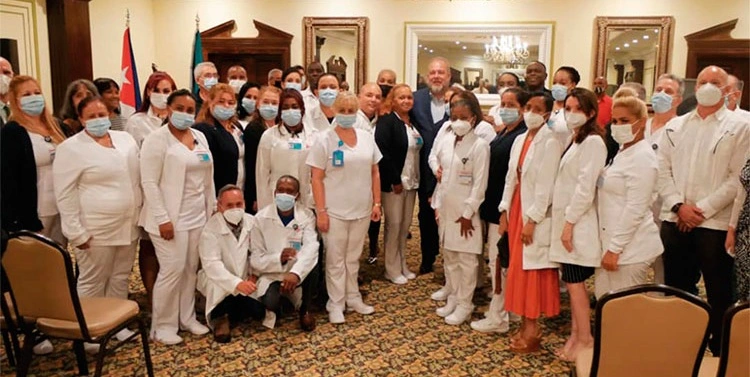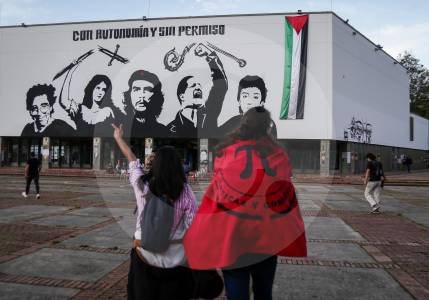
U.S. and Bahamas to Hold Talks on Hiring of Cuban Doctors
- Cuba
- mayo 31, 2025
- No Comment
- 55
MADRID, Spain – Bahamian Prime Minister Philip Davis led a delegation on May 5th to meet with senior U.S. officials with the aim of addressing the hiring of Cuban doctors in Nassau and the recent visa restrictions imposed by Washington on officials linked to the Cuban medical missions.
The visit was confirmed by Bahamian government press secretary Keishla Adderley, who explained that the meeting seeks to respond to the decisions made by the U.S. administration regarding a program that has been considered a form of “labor exploitation.”
“As you know, the issue of how Cuban doctors are compensated is one that has raised concern and been flagged by U.S. Secretary of State Marco Rubio,” Adderley emphasized, as quoted by the EFE news agency.
Marco Rubio, of Cuban origin and one of the most outspoken critics of the Havana regime, has repeatedly described the medical missions as a system of “human trafficking,” alleging that professionals are sent abroad under coercive conditions with little to no direct compensation.
According to documents from the organization Cuba Archive, Bahamas pays between $999 and $1,200 per month for each Cuban doctor. However, the funds allocated by the Bahamian state to Cuba far exceed those amounts. A report recently published by Cuba Archive states that the Bahamian government sends approximately $11 million annually to the Cuban regime as part of the healthcare cooperation agreement signed with the state-run Cuban Medical Services Trading Company (CSMC, by its Spanish acronym).
A Cooperation Model Denounced for Labor Violations
The agreement, signed in 2023 between the Bahamian Ministry of Health and CSMC, includes the hiring of dozens of Cuban professionals not only in the health sector, but also in areas such as education and medical technology. X-ray technicians, physical therapists, and biomedical engineers are among the personnel sent to the archipelago. However, the contract prohibits these workers from being hired independently and grants the Cuban company disciplinary control over them.
The payment structure outlined in the agreement shows that Bahamas pays up to $12,000 per month for each “medical specialist advisor,” of which only $1,200 is given to the worker. In other categories, such as computer engineers or health technicians, monthly payments are around $5,000, with only $990 reaching the professional. This means the Cuban regime retains between 83.9% and 91.6% of the income generated by each worker, a practice that experts have described as a form of disguised forced labor.
In April of this year, Washington reiterated its critical stance against the Cuban medical missions, considering them a model based on the exploitation of Cuba’s own citizens. In a statement published on ShareAmerica, an official U.S. government website, it was denounced that Havana profits from these programs through the “forced labor of its workers,” and that its “abusive and coercive” practices are “well documented.”
“The United States is determined to counter the practice of forced labor around the world,” Rubio declared in February 2025, as he announced new visa restrictions targeting officials involved in the program.
According to the U.S. report, more than 22,000 Cuban workers—mostly doctors—are deployed in around 50 countries. In 2022, the Cuban government is believed to have received nearly $4.9 billion from these services, retaining between 75% and 95% of the wages owed to each worker.
Former members of the medical brigades have reported abuses such as the confiscation of passports, lack of direct payment, threats of retaliation if they leave the program, and severe restrictions on their mobility. Some of them filed a class-action lawsuit against the Cuban government in 2018, a legal process that is still ongoing.
Accusations against this system are not limited to the U.S. government. In 2023, the UN Special Rapporteur on Contemporary Forms of Slavery expressed concern over the conditions in which Cuban doctors were working in countries such as Italy, Qatar, and Spain. According to the report, these professionals faced wage confiscation, movement restrictions, and limitations on their interactions with the local population.
Recibe la información de CubaNet en tu celular a través de WhatsApp. Envíanos un mensaje con la palabra “CUBA” al teléfono +1 (786) 316-2072, también puedes suscribirte a nuestro boletín electrónico dando click aquí.





